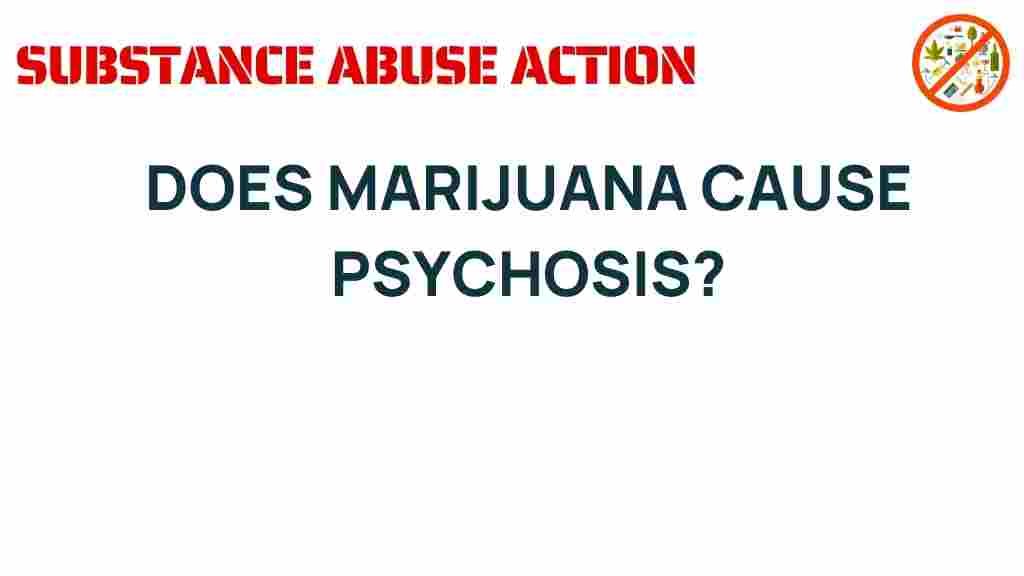Unraveling the Link: Does Marijuana Cause Psychosis?
The relationship between marijuana and psychosis has been a topic of intense debate among researchers, mental health professionals, and the public. As cannabis becomes increasingly legalized and accepted in various parts of the world, understanding its effects on mental health is more important than ever. This article aims to explore the connection between marijuana and psychosis, examining the symptoms, research findings, and potential treatment options available.
Understanding Psychosis
Psychosis is a mental health condition characterized by a disconnection from reality. Individuals experiencing psychosis may have hallucinations (seeing or hearing things that aren’t there) or delusions (strongly held false beliefs). The symptoms of psychosis can be distressing and may significantly impact daily functioning.
Common Symptoms of Psychosis
- Hallucinations
- Delusions
- Disorganized thinking
- Severe mood swings
- Social withdrawal
- Difficulty functioning in daily life
Research on Marijuana and Psychosis
Research has shown a complex relationship between cannabis use and the onset of psychosis. Some studies suggest that marijuana may trigger psychotic episodes in individuals predisposed to mental health disorders. The connection is particularly evident in those who use high-potency cannabis products.
Key findings from recent research include:
- Increased risk of developing psychosis in frequent cannabis users.
- Higher rates of psychotic disorders in individuals who consume cannabis during adolescence.
- Genetic predispositions may amplify the risk factors associated with marijuana use and psychosis.
The Role of THC and CBD
The two primary compounds in cannabis are tetrahydrocannabinol (THC) and cannabidiol (CBD). THC is the psychoactive component responsible for the “high” associated with marijuana, while CBD is non-psychoactive and is often studied for its potential therapeutic effects.
Research indicates that:
- High levels of THC may contribute to the development of psychotic symptoms.
- CBD may have antipsychotic properties and could potentially mitigate some of the adverse effects of THC.
Marijuana Use and Addiction
While not everyone who uses marijuana will develop an addiction, research indicates that approximately 9% of users become dependent on it. This number increases to about 17% for those who start using in their teens. Recognizing the signs of addiction is crucial for early intervention and treatment.
Signs of Marijuana Addiction
- Craving cannabis despite negative consequences.
- Inability to cut down or stop using marijuana.
- Withdrawal symptoms when not using.
- Using more cannabis than intended.
Prevention Strategies
Preventing marijuana-related psychosis and addiction involves a combination of education, awareness, and healthy coping strategies. Here are some effective approaches:
- Education: Understanding the risks associated with marijuana use can empower individuals to make informed decisions.
- Healthy Coping Mechanisms: Finding alternative ways to cope with stress and anxiety can reduce reliance on substances.
- Support Systems: Engaging with family and friends for support can help individuals resist the urge to use marijuana.
Treatment Options for Psychosis
If someone experiences psychosis linked to marijuana use, it’s essential to seek professional help. Treatment options may include:
- Medication: Antipsychotic medications can help manage symptoms of psychosis.
- Psychotherapy: Cognitive-behavioral therapy (CBT) can assist individuals in understanding and managing their thoughts and behaviors.
- Support Groups: Connecting with others who have similar experiences can provide comfort and guidance.
Troubleshooting Tips for Managing Symptoms
If you or someone you know is experiencing symptoms of psychosis related to marijuana use, consider the following steps:
- Seek Professional Help: Contact a mental health professional for evaluation and support.
- Avoid Further Cannabis Use: Ceasing marijuana consumption may help alleviate symptoms.
- Practice Mindfulness: Techniques such as meditation and deep breathing can aid in managing anxiety and stress.
Concluding Thoughts
The link between marijuana use and psychosis is significant and warrants careful consideration, particularly among young users and individuals with a family history of mental health disorders. While cannabis may offer therapeutic benefits for some, its potential risks cannot be ignored. Ongoing research is vital to fully understand the complex effects of cannabis on mental health.
If you are struggling with cannabis use or experiencing symptoms of psychosis, it is crucial to reach out for help. Resources such as NAMI can provide support and guidance to those in need.
For further reading on the effects of cannabis and mental health, check out this research article.
Remember, your mental health is essential, and seeking help is the first step towards recovery.
This article is in the category Health and created by SubstanceAbuseAction Team
